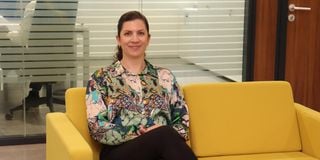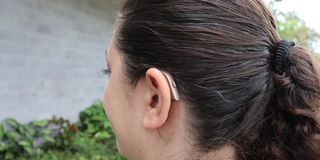Premium
Tales of courage: Learning to cope with sudden hearing loss

Maayan Almagor, a Chief Administration Officer and Consul at the Embassy of Israel in Kenya.
Maayan Almagor, a Chief Administration Officer and Consul at the Embassy of Israel in Kenya, had everything going for her.
In 2016, then 28 years old, she moved to India after her husband was appointed as head of the economic mission in the Israeli Embassy in New Delhi.
“I joined him without any idea of what I was going to do. The Ministry of Foreign Affairs was something I had never heard about and I was not familiar with the embassy's activities,” she said.
And shortly after this, she found herself in the position of public diplomacy officer in charge of innovation. She was at the peak of her career, and everything seemed to be going right.
Then, one morning in 2018, she woke up and could not hear anything.
She did not give much thought to it, thinking she had excess wax in her ears. She cleaned her ears and downplayed the whole situation, not realising that her life was about to change forever.
“I had had 100 percent hearing my entire life with no issues and woke [up] to zero one morning.
“I did not think it was something serious and went to the doctor. I was advised to do an MRI (Magnetic Resonance Imaging – a type of scan that uses strong magnetic fields and radio waves to produce detailed images of the inside of the body). I did [the MRI] and went and bought ear drops and went home,” she says.
When she returned to the doctor, the MRI revealed she had suffered sudden hearing loss. But since she was pregnant, the doctor thought it was one of her pregnancy symptoms.
According to the National Institute on Deafness and Other Communication Disorders, sudden sensorineural (“inner ear”) hearing loss (SSHL), commonly known as sudden deafness, is an unexplained, rapid loss of hearing, either all at once or over a few days. Hearing loss arises in the hearing organ of the inner ear (cochlea) or the hearing nerve, not in the middle or outer ear.
The doctor asked her to ignore the issue as it would likely be gone by the time she gave birth. “After the assurance by the doctor, I relaxed,” Maayan says.
When she was eight months pregnant, she returned to Israel and decided to see an Otolaryngologist for a second opinion.
“When the doctor saw me, he was shocked that I took that long to see a specialist,” she says.
The soon-to-be mum was in disbelief that she had lost her hearing ability.
“The doctor asked me to focus on the pregnancy, and we would start on the treatment after the child was born,” Maayan says.
However, she felt that this is a very long period to wait for treatment, so she decided she would buy hearing aids thinking it was just something she could ‘plug and play’.

A photo showing Maayan Almagor's hearing aid.
A hearing aid is a small electronic device you wear in or behind your ear. It makes some sounds louder so that a person with hearing loss can listen, communicate, and participate more fully in daily activities. A hearing aid can help people hear more in quiet and noisy situations. However, only about one out of five people who would benefit from a hearing aid uses one.
After deciding she needed the hearing aids, Maayan went home and bought the best she could find in the market and tried them on. However, the sounds did not making sense, and she realised she needed to learn how to use the devices.
“In those two weeks as I waited to welcome my child to this world, I thought my life was over,” Maayan says. “When my son was born, I remember the doctors and nurses talking to me and the hearing aids were just confusing.”
After giving birth, she experienced one of the lowest points of her life.
“As I sat on my hospital bed, it dawned on me that I will never hear my son cry, I will never hear him say his first words. It was painful.”
But, there was no time to feel sorry for herself. So, she picked herself up and began planning as she knew she had only about nine months before the baby began to speak his first words.
“I moved from a very depressed person to a very inspired one. He gave me more reason to find a solution to my problem,” she added.
In addition, she had family around to help her when she didn’t hear the baby cry. She also bought a gadget that would light up with different colours when the baby cried.
The new mum also began researching how to use her hearing aid. She found out that hearing aids take time and patience to operate successfully, and wearing them regularly helps a person to adjust to them.
“I leant that my hearing aid works like a robot which is learning; I have to train it, that in the first six months they learn what I hear.”
Maayan began listening to long radio programmes and trying to understand what they were saying, and within no time, the hearing aids started picking up the words.
“One day I was listening to a radio show and I realised I could hear what they were saying all through the show,” she says.
During this time, close friends and relatives also helped the former military member learn to use her hearing aids.
They would read a book or talk to her while she was facing away; they would then repeat the same things while facing her, and she would read their lips—she began learning to read lips by observing her relatives and also intently watching people on the television.
“By the time my son was saying his first words, I had learned to use the hearing aids and I could hear every word and sound he made.”
According to Maayan, many people with hearing problems have given up on hearing aids because they do not understand how to use them.
She believes that creating awareness about hearing aids will improve their early uptake and help hearing impaired people, and even children, to learn to use them early. Additionally, she observes that after sale services are rare yet learning to correctly use hearing aids is a gradual process.
“Now I want to give back to humanity by teaching people in the same situation I was a few years back on how to use hearing aids; they need to learn to train their hearing aids. Even children who are born deaf can learn to use hearing aids and within no time, they will be speaking fluently,” she adds.
Today, as Maayan goes about her daily business, one can hardly tell she has a hearing impairment.
***
Do you have feedback on this article? Please e-mail: [email protected]




